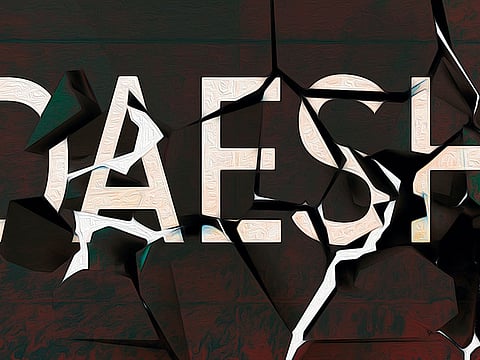Has Daesh been vanquished?
It may be trying to re-assemble but the destruction of this evil ideology is a major blow to the organisation

Despite the challenges, trepidations and potential setbacks that may happen in the weeks and months of 2018, let us for a moment bask in the sunshine because of the effective elimination or near ejection and eradication of Daesh (the self-proclaimed Islamic State of Iraq and the Levant) in Iraq and Syria, the deadly organisation which held hostage some eight million people in the northern parts of these countries for what seem years-on-end.
For Iraq and possibly Syria, it is liberation at last from the grip of that superannuated and violent organisation that ruled tooth-and-nail over a large swathes of regions (as large as Italy) since 2014 whilst at one time controlling a third of Iraq. Now the populations there can take a well-earned breather before they start picking up the pieces. At least in Iraq the construction of destroyed buildings and ruinous infrastructure can begin to take place and the return of more than five million persons displaced as a result of the concerted war to get rid of Daesh continued since late 2016 with the help of the international war coalition.
Army gaining its morale back
Iraq can stand tall now with its army gaining its morale back, having been at all two low since 2003 when Saddam Hussain was ousted. This is also despite the fact that the army and security forces lost over 35,000 of its security men, with an equal number injured during three years of fighting against the organisation. But there were also a series of battles that were won, also with their resourceful energy and gusto, in the east of the country, Syria-Iraq borders and in the north of the state in Mosul and the surrounding areas, that proved more deadly, concerted and protected.
The war against Daesh in Syria is another story and clogged up in the socio-political geography of the country’s civil war. While Russia, also announced the end of war on Daesh, after its self-styled capital, Raqqa, fell, two days before Iraqi Prime Minister Haider Abadi’s statement on 10 December, 2017, which he declared an official holiday, there is more than meets the eye.
Anxiety
Behind the razzmatazz and jubilation, and who can blame them, there continues to be deep-seated feelings of anxiety among sectors of society, including the government, that Daesh must not be allowed to resurface. For that the security forces, army and police must be strengthened to stamp out the remnants of Daesh (some of whom are now feared to be milling inside population centres), in “pockets” in different areas of Iraq and/or simply in the desert bidding their time as “sleeper cells” ready to relaunch.
The onus now lies on the state to use all its might to clobber the organisation once-and-for-all. From military strength, almost everyone agrees, Daesh has ended, as a structure, infrastructure and a dominating presence. But on a cultural and intellectual levels, it is believed that Daesh’s “Takfiri” thought processes still persist, especially among the people it has ruled and may have bought them over through their oil booty and forced indoctrination. So what must be done now on the part of the government is to embark on carefully thought-out programmes, workshops, public relations campaigns, intellectual debates — through media — to highlight the fact that extremism is not part of Arab culture and tradition. Some onus lies on Europe too and it must also embark on similar programmes through their many associations, targeting their populations and Muslim communities.
Very little time to lose
There is probably very little time to lose. This is especially because since their downfall in Iraq and Syria (French President Emmanuel Macron believes the war on Daesh will take till February to be eliminated completely), their fighters have been retreating and embarking on flights from war zones and “influxes” either to the surrounding regions or to parts of Europe. They are now fears that these terrorists are coming back, as outlined most clearly by Spain, which warned that Europe is now under threat that cannot be taken lightly.
The Iraq-Syria disengagement has meant Daesh fighters have slowly started retreating to all corners of the globe, possibly connecting and reconnecting with the alliances they built with other extremist organisation, including the Boko Haram in Nigeria, Al Shabab in Somalia, and groups in Tajikistan to Pakistan.
The situation has indeed become fluid. Today, there is much talk that the movement is “re-forming” and “re-assembling” under different names. But whatever the case, the destruction of this evil ideology is indeed a major blow to the organisation and may herald its end.
Marwan Asmar is a commentator based in Amman. He has long worked in journalism and has a PhD in Political Science from Leeds University in the UK.
Sign up for the Daily Briefing
Get the latest news and updates straight to your inbox


